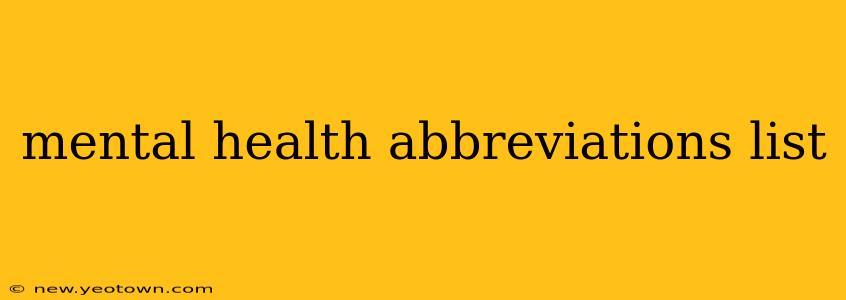Navigating the world of mental health can feel like deciphering a secret code, especially when faced with a barrage of abbreviations. This isn't just a list; it's a story, a journey into understanding the language used to discuss mental wellbeing. Imagine you're a new detective on the case, needing to crack the code to help those in need. These abbreviations are your clues.
This guide will unravel some of the most common mental health abbreviations, providing context and clarity. We'll cover conditions, treatments, and organizations, empowering you to navigate conversations and resources with greater confidence. Think of it as your mental health decoder ring!
Common Mental Health Abbreviations and Acronyms
Let's start with some of the most frequently encountered abbreviations. Each one represents a piece of the puzzle, a vital component in understanding mental health.
- ADHD: Attention-Deficit/Hyperactivity Disorder. This is like finding a crucial fingerprint at a crime scene – a key piece of identifying a specific challenge. It involves difficulties with focus, impulsivity, and hyperactivity.
- OCD: Obsessive-Compulsive Disorder. Imagine tracing a pattern – OCD involves persistent, unwanted thoughts (obsessions) and repetitive behaviors (compulsions) designed to reduce anxiety. Unraveling this pattern is critical to understanding the individual's experience.
- PTSD: Post-Traumatic Stress Disorder. This abbreviation is a marker of a significant event – a traumatic experience that continues to impact an individual's life long after the event has passed. Symptoms can include flashbacks, nightmares, and avoidance behaviors.
- SAD: Seasonal Affective Disorder. Think of this as a recurring seasonal pattern, linked to changes in sunlight and affecting mood, sleep, and appetite. Understanding this pattern is vital in developing effective treatment strategies.
- BPD: Borderline Personality Disorder. This is a complex case, involving unstable relationships, mood swings, and a fear of abandonment. It highlights the importance of nuanced understanding and specialized support.
- MDD: Major Depressive Disorder. This points to a serious diagnosis, characterized by persistent sadness, loss of interest, and other significant symptoms impacting daily life.
- GAD: Generalized Anxiety Disorder. This is a constant, low-level hum of worry, impacting many aspects of a person's life. It's important to distinguish this from normal anxiety to provide appropriate care.
- CBT: Cognitive Behavioral Therapy. This is a treatment method – a crucial tool in the detective's arsenal – designed to help individuals identify and change negative thinking patterns and behaviors.
- DBT: Dialectical Behavior Therapy. Another powerful treatment approach, particularly effective for conditions such as BPD, it teaches coping skills and emotional regulation techniques.
- SSRI: Selective Serotonin Reuptake Inhibitor. This is a class of antidepressants, offering a pharmacologic solution. Understanding its role alongside other treatments is vital in crafting a comprehensive approach.
- SNRI: Serotonin-Norepinephrine Reuptake Inhibitor. Another class of antidepressants, these medications affect both serotonin and norepinephrine neurotransmitters.
- TMS: Transcranial Magnetic Stimulation. This is a non-invasive brain stimulation technique used to treat depression, providing a more targeted treatment approach.
Understanding the Context: Why Abbreviations Matter
These abbreviations aren't just shorthand; they represent complex conditions and treatments. Using them correctly demonstrates respect and understanding, crucial in fostering trust and effective communication within the mental health community.
What are some other common mental health abbreviations?
Many other abbreviations exist, varying in their level of common usage. Some may be specific to certain research settings or clinical contexts. To find more specific abbreviations, searching online using specific terms like "schizophrenia abbreviations" or "eating disorder abbreviations" will lead you to relevant information.
How can I learn more about specific mental health conditions?
The best way to learn more about specific conditions is through reputable sources like the National Institute of Mental Health (NIMH) or the Mental Health America (MHA) websites. These organizations provide detailed information, resources, and support for individuals and families affected by mental illness.
Where can I find reliable information about mental health treatments?
Information about treatments can be found on the websites of professional organizations such as the American Psychiatric Association (APA) and the American Psychological Association (APA). Your doctor or therapist can also provide personalized advice and guidance regarding appropriate treatments for your specific needs. Remember, this is a collaborative effort – your input is crucial.
This journey into the world of mental health abbreviations is just the beginning. Remember, understanding the language is a critical first step in understanding the complexities of mental health and providing support to those who need it most. The more we understand, the more effectively we can help.

